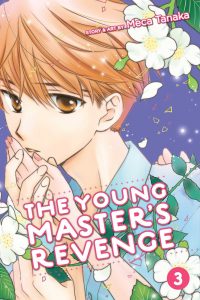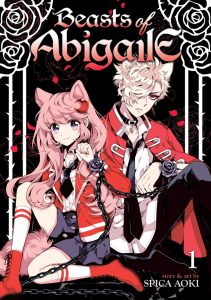In which I cover several new(er) series and a digital one-shot!
 Daytime Shooting Star, Vol. 1 by Mika Yamamori
Daytime Shooting Star, Vol. 1 by Mika Yamamori
Fifteen-year-old Suzume Yosano has been going to school with the same kids in her country town for as long as she can remember, but when her dad gets transferred to Bangladesh for work, Suzume ends up transferring to school in Tokyo and living with her uncle. When she faints on the way to his house, one of his customers (he runs a café) helps her find her way. The next day, she learns that her savior is her homeroom teacher, Mr. Shishio.
I don’t generally like student-teacher romances, but Daytime Shooting Star runs in Margaret, a magazine that many of my favorites have come from, so I was willing to give it a chance. And, indeed, I do like it! Suzume is a fun lead character. She’s much more forthright than one normally sees in a shoujo heroine, particularly with how she deals with a mean girl (Yuyuka Nekota), and yet kind of humble at the same time. She’ll state clearly her position and unabashedly apologize when she’s wrong. I like her a lot.
Shishio is fairly likeable, too. Twenty-four years old and handsome, he’s popular with the girls, but rather than coming across as skeevy, so far he seems genuinely interested in helping out kids who might be struggling. It might be a little dodgy that he’s willing to come privately tutor Suzume after she spectacularly fails a quiz, but it’s apparently something he does for all of his students who need extra help.
What makes Daytime Shooting Star acceptable is that, so far, Shishio does not seem to have any romantic interest in Suzume whatsoever. Some promising retrospective narration adds, “At that time, even if I had known he was out of reach like that star, I was still drawn to him.” If this is the story of a girl’s unrequited first love, I am totally here for that. If Shishio starts to reciprocate, it’ll be time to reevaluate.
Daytime Shooting Star is complete in twelve volumes. VIZ will release the second volume in September.
 Komi Can’t Communicate, Vol. 1 by Tomohito Oda
Komi Can’t Communicate, Vol. 1 by Tomohito Oda
Serialized in Shounen Sunday (and possessed of that unique charm that many series from that magazine possess), Komi Can’t Communicate is the story of Shoko Komi, a girl so lovely she’s seen as an unapproachable beauty possessed of cool reserve when actually she has a communication disorder and, though she would love to make friends, can’t manage to talk to anyone. One day, her timid classmate Hitohito Tadano happens to hear her talking to herself and ends up befriending her—over the course of a sprawling chalkboard conversation—and vowing to help her achieve her goal of making 100 friends.
The pacing of the series is very much like a 4-koma manga, but the panel layout is more like standard manga, so even though each page kind of has a punchline, it also feels like a through-composed story. Throughout the course of this first volume Tadano helps Komi make friends with Najimi Osana, his junior high friend of ambiguous gender, and Himiko Agari, a super-nervous girl for whom Komi feels particular affinity. Various hijinks ensue, including Najimi seeming to use Komi as an errand girl by sending her off to fetch a complicated coffee order—though perhaps this really was intended as useful practice for her?—and Tadano and Komi attempting to join in on some classroom games and faring terribly, with Tadano ultimately sacrificing his own reputation in order to spare Komi’s. I only laughed out loud once, but overall, it was pretty cute.
The elite prep school they attend has a reputation for admitting many quirky individuals, so presumably Oda-sensei won’t want for material any time soon. I shouldn’t expect anything deep from this series, or any sort of social renaissance for Tadano, so if I keep that in mind, I foresee this being an enjoyable, easy read for a long time to come.
Komi Can’t Communicate is ongoing in Japan, where the thirteen volume comes out this month. VIZ will release volume two in August.
 Snow White with the Red Hair, Vol. 1 by Sorata Akiduki
Snow White with the Red Hair, Vol. 1 by Sorata Akiduki
Shirayuki is renowned in the country of Tanbarun for her apple-red hair. When the infamously foolish Prince Raj decides that she’s going to be his next concubine, Shirayuki cuts her hair and flees. She winds up making the acquaintance of a boy named Zen, who turns out to be the younger prince of the neighboring Clarines kingdom. After they defeat Prince Raj’s henchman, they decide to stick together. Zen returns home to the Clarines capital city where Shirayuki starts studying to become a court herbalist.
I really liked the characters in this one. Shirayuki is smart and has a definite goal that she wants to earn for her own merits and not through Zen’s benevolence. She is never once spazzy. Although her unique beauty (and a developing reputation as a “treasure even a prince failed to nab”) makes her a target, which sometimes requires Zen to come to her rescue, she is suitably defiant and resourceful enough on her own that this does not play out like a typical shoujo trope. For his part, Zen is wonderfully supportive of her goals and, furthermore, demonstrates that he understands her when he dismisses someone’s suggestion that he should just appoint her to be court herbalist.
This is kind of a low-key series so far, but it’s exceedingly charming and I very much look forward to continuing with it.
Snow White with the Red Hair is ongoing in Japan, where 20 volumes have been released so far. Volume two comes out in English tomorrow.
 That Blue Sky Feeling, Vols. 1-2 by Okura and Coma Hashii
That Blue Sky Feeling, Vols. 1-2 by Okura and Coma Hashii
When friendly and outgoing Dai Noshiro transfers to a new school, he can’t help but notice that one student is always alone. Kou Sanada insists that Noshiro doesn’t have to go out of his way to talk to him, but Noshiro is convinced that Sanada is lonely and keeps trying to befriend the boy, even after hearing rumors that Sanada is gay. He chastises others for treating Sanada differently, but must confront his own reaction when, after Sanada backtracks after admitting the rumor is true and instead claims to have been joking, relief is his primary emotion. To his credit, he realizes the impact of his words and swiftly apologizes.
The bulk of these two volumes concerns these very different boys getting to know each other. Noshiro is big and loud but profoundly innocent in the realm of romance. He had notions of protecting Sanada, but soon realizes, “He’s way more grown-up than me!” (Sanada has had at least one boyfriend, Hide, who is 26. Seeing as how Sanada is in high school, this is a little creepy, but Hide actually proves to be a decent guy who gives Noshiro a lot of helpful advice.) Sanada is reserved and prefers to keep out of the spotlight, which is difficult when someone as boisterous as Noshiro is around.
Sanada is also pretty anxious, and I loved that every time he worried that Noshiro wouldn’t accept him or that he should continue to keep parts of his life separate, Noshiro would surprise him. One good example is when Sanada meets up with a guy he met online and Noshiro spots them walking around town together. Sanada expects the worst. “The more he gets to know me the more Noshiro will be weirded out by me. I just know it.” But the truth is… Noshiro is just upset that other people can make Sanada smile more easily than he can, and this bugs him for some reason.
By the end of volume two, it’s clear that Sanada is starting to have feelings for Noshiro, and that he’s jealous when another boy starts crushing on him, too. It’s unclear whether Noshiro is feeling the same—he’s so clueless romantically that he actually thought Sanada might start dating a female classmate simply because she is his friend—though he does at least realize that what he feels for Sanada is special. I do hope they get together in the end, but a more bittersweet ending would be satisfying, too.
That Blue Sky Feeling is complete in three volumes. The final volume will be released in English in October.
 Will I Be Single Forever? by Mari Okazaki
Will I Be Single Forever? by Mari Okazaki
As a big fan of Okazaki’s Suppli, I was delighted when VIZ decided to offer one of her titles in a digital-only format. Based on an essay by Mami Amamiya, Will I Be Single Forever? features the interconnected stories of three unmarried and proudly self-reliant women in their thirties.
Mami is 36 and a successful writer, though her mother pities her for her singlehood. “I’m finally capable,” Mami laments, “but she feels sorry for me.” Reuniting with family for a funeral reminds Mami how others have assumed their places as wives and mothers, but it’s her free-spirited single uncle who really seems to be enjoying life. She wants to be like him.
Yukino has broken up with a guy who she didn’t really like that much, but is upset nevertheless. After a brief attempt at rekindling with an old flame—and realizing with horror that she was so scared of being alone that her memories of why they broke up temporarily vanished—she decides to go on the trip she and her ex had planned to take by herself and has a blast.
Shimizu has a lover she forgets about for weeks at a time and turns down a rendez-vous with him in favor of work, which she finds more fulfilling. She ponders if fixating on random projects is just protecting herself from something, but in the end concludes the work is honestly rewarding. “I want to keep going down this path.” (My one complaint here is that the exact nature of these projects is kept vague, something that also bugged me in Suppli.)
In the final chapter, the women convene after Mami almost gets married. Her fiancé was a jerk from a family of jerks, and she emerges from the experience literally and figuratively battered and bruised. The final scene is marvelous, as the trio creates their own definition of happiness: “Eating good food. Reading your favorite books. Telling yourself “Good job!” at work. Eating a whole bag of potato chips in the middle of the night. And getting those things for yourself with your own strength.”
In the interview at the end of the book, the creators assure readers they bear no ill will towards married ladies and stress that it’s the independence, the having of one’s own life that is most important. I think I would’ve preferred a much longer series fleshing out these characters, but it was a good, affirming read nonetheless!
Will I Be Single Forever? is complete in one volume.
 Love in Focus, Vol. 1 by Yoko Nogiri
Love in Focus, Vol. 1 by Yoko Nogiri My Sweet Girl, Vol. 1 by Rumi Ichinohe
My Sweet Girl, Vol. 1 by Rumi Ichinohe Ran the Peerless Beauty, Vol. 1 by Ammitsu
Ran the Peerless Beauty, Vol. 1 by Ammitsu World’s End and Apricot Jam, Vols. 1-2 by Rila Kirishima
World’s End and Apricot Jam, Vols. 1-2 by Rila Kirishima Kenka Bancho Otome: Love’s Battle Royale, Vols. 1-2 by Chie Shimada
Kenka Bancho Otome: Love’s Battle Royale, Vols. 1-2 by Chie Shimada Takane & Hana, Vols. 1-4 by Yuki Shiwasu
Takane & Hana, Vols. 1-4 by Yuki Shiwasu The Young Master’s Revenge, Vols. 1-3 by Meca Tanaka
The Young Master’s Revenge, Vols. 1-3 by Meca Tanaka I admit that I was initially attracted to Lovesick Ellie because of the covers, which are adorable. My favorite is the third, because it perfectly captures Ohmi-kun’s personality.
I admit that I was initially attracted to Lovesick Ellie because of the covers, which are adorable. My favorite is the third, because it perfectly captures Ohmi-kun’s personality. Eriko Ichimura is a plain girl whom nobody notices. (Yes, this is one of those Dessert manga where the friendless girl attracts the notice of the most popular boy in school.) In lieu of real relationships, Eriko entertains herself by writing fantasies about Ohmi-kun on an anonymous Twitter account under the name Lovesick Ellie. One day, she accidentally catches a glimpse of the real Ohmi-kun. Shocked, she leaves her cellphone behind, enabling Ohmi to read her tweets about him. Rather than be mad, he thinks they’re hilarious. In exchange for her keeping his secret, he offers to fulfill her fantasies, then laughs when she’s, like, “Okay!” In the end, he decides to trust her.
Eriko Ichimura is a plain girl whom nobody notices. (Yes, this is one of those Dessert manga where the friendless girl attracts the notice of the most popular boy in school.) In lieu of real relationships, Eriko entertains herself by writing fantasies about Ohmi-kun on an anonymous Twitter account under the name Lovesick Ellie. One day, she accidentally catches a glimpse of the real Ohmi-kun. Shocked, she leaves her cellphone behind, enabling Ohmi to read her tweets about him. Rather than be mad, he thinks they’re hilarious. In exchange for her keeping his secret, he offers to fulfill her fantasies, then laughs when she’s, like, “Okay!” In the end, he decides to trust her. As they navigate their new relationship, there are various firsts, and a lot of blushing, and some misunderstandings, and some mean girls who disapprove of Ohmi dating someone (though they mistakenly think he’s dating Sara, the friend Eriko eventually acquires). None of this is new shoujo manga territory, but the characters are refreshing. Ohmi is seriously endearing, especially once his bratty attitude subsides and he allows himself to be sweet and vulnerable. He’s apologetic for the things he gets wrong, and encourages Eriko not to give up on him. For her part, Eriko is kind of a spaz, but shoujo heroines are not typically this horny, so that’s a unique aspect, for sure. It certainly makes for some snerkworthy declarations, like when she proclaims, “I like you sexually!”
As they navigate their new relationship, there are various firsts, and a lot of blushing, and some misunderstandings, and some mean girls who disapprove of Ohmi dating someone (though they mistakenly think he’s dating Sara, the friend Eriko eventually acquires). None of this is new shoujo manga territory, but the characters are refreshing. Ohmi is seriously endearing, especially once his bratty attitude subsides and he allows himself to be sweet and vulnerable. He’s apologetic for the things he gets wrong, and encourages Eriko not to give up on him. For her part, Eriko is kind of a spaz, but shoujo heroines are not typically this horny, so that’s a unique aspect, for sure. It certainly makes for some snerkworthy declarations, like when she proclaims, “I like you sexually!” After having been bullied in school back home in Japan, Tsukishiro Nina comes to live with her uncle in the tiny principality of Ruberia, famous for its roses. Outwardly, it’s an affluent place, but Nina soon learns—after being bitten by a luga and taking on some of their characteristics—that wolf-like people known as luga serve as slave labor for the humans in Ruberia, and that young luga are all rounded up and sent to an island prison/school called Abigaile, where they learn how to serve humans. Nina is sent there after her transformation and must try to blend in, because if the other luga find out she’s human, they’ll turn on her.
After having been bullied in school back home in Japan, Tsukishiro Nina comes to live with her uncle in the tiny principality of Ruberia, famous for its roses. Outwardly, it’s an affluent place, but Nina soon learns—after being bitten by a luga and taking on some of their characteristics—that wolf-like people known as luga serve as slave labor for the humans in Ruberia, and that young luga are all rounded up and sent to an island prison/school called Abigaile, where they learn how to serve humans. Nina is sent there after her transformation and must try to blend in, because if the other luga find out she’s human, they’ll turn on her. That said, Nina is actually the least interesting character to me. I probably shouldn’t like Roy, the luga who bit her and who is the alpha of the most dangerous “home” (basically a pack) in Abigaile. He enjoys tormenting Nina but he’s definitely the most fascinating character so far, especially when we learn at the end of volume two that he himself had hoped to unite the luga but couldn’t. Nina and Roy actually remind me of Clarke and Bellamy in The 100—two teens who emerged as leaders from among a disenfranchised group of youth who disagree with each other’s methods, but if they could trust each other and become a team, then they might really have a chance. (Granted, I haven’t seen more than a handful of episodes at this point.) I like that dynamic between them and look forward to Roy eventually coming to trust Nina.
That said, Nina is actually the least interesting character to me. I probably shouldn’t like Roy, the luga who bit her and who is the alpha of the most dangerous “home” (basically a pack) in Abigaile. He enjoys tormenting Nina but he’s definitely the most fascinating character so far, especially when we learn at the end of volume two that he himself had hoped to unite the luga but couldn’t. Nina and Roy actually remind me of Clarke and Bellamy in The 100—two teens who emerged as leaders from among a disenfranchised group of youth who disagree with each other’s methods, but if they could trust each other and become a team, then they might really have a chance. (Granted, I haven’t seen more than a handful of episodes at this point.) I like that dynamic between them and look forward to Roy eventually coming to trust Nina. Tetsu Misato makes up for what he lacks in height with his energy and determination. Due to a mysterious promise he made to his hospitalized mother, Tetsu is driven to earn money. So much so that he plains to join the work force after graduation and already is working several part-time jobs while in high school, abandoning the soccer team as a result. To prove to his father that he is ready to hold down a job, he begins working through his father’s housekeeping agency at the Karasawa mansion. There have long been rumors that the place is haunted, but Tetsu soon learns that the “frail, sickly daughter” who allegedly lives in a separate building is a real and friendly girl, no apparition at all.
Tetsu Misato makes up for what he lacks in height with his energy and determination. Due to a mysterious promise he made to his hospitalized mother, Tetsu is driven to earn money. So much so that he plains to join the work force after graduation and already is working several part-time jobs while in high school, abandoning the soccer team as a result. To prove to his father that he is ready to hold down a job, he begins working through his father’s housekeeping agency at the Karasawa mansion. There have long been rumors that the place is haunted, but Tetsu soon learns that the “frail, sickly daughter” who allegedly lives in a separate building is a real and friendly girl, no apparition at all. Mitsuki Haruno is a first-year in high school who has always had trouble making friends. Her luck begins to change when she befriends the most popular quartet of boys in school. If someone read those sentences to me and asked me to guess in which magazine this manga was serialized, I’d say Dessert, based on past offerings we’ve seen from them (like Say I Love You.). And I would be right.
Mitsuki Haruno is a first-year in high school who has always had trouble making friends. Her luck begins to change when she befriends the most popular quartet of boys in school. If someone read those sentences to me and asked me to guess in which magazine this manga was serialized, I’d say Dessert, based on past offerings we’ve seen from them (like Say I Love You.). And I would be right. I also quite liked Mitsuki as a character. I could foresee a version of this story in which her failures to initiate social interaction with others might be frustrating, but that’s not the case here at all. The key seems to be Mitsuki’s honesty about the past experiences that are holding her back in the present, and by the end of the third volume she has made two female friends. Reina is, awesomely, a major fujoshi and envisions the four boys (all of whom are on the basketball team) in romantic pairings. I love the little background gags of her taking surreptitious pictures of them. Maki is a member of the girls basketball team who, unbeknownst to Mitsuki, also has a thing for princely Asakura.
I also quite liked Mitsuki as a character. I could foresee a version of this story in which her failures to initiate social interaction with others might be frustrating, but that’s not the case here at all. The key seems to be Mitsuki’s honesty about the past experiences that are holding her back in the present, and by the end of the third volume she has made two female friends. Reina is, awesomely, a major fujoshi and envisions the four boys (all of whom are on the basketball team) in romantic pairings. I love the little background gags of her taking surreptitious pictures of them. Maki is a member of the girls basketball team who, unbeknownst to Mitsuki, also has a thing for princely Asakura. But will he act on those feelings? The boys on the basketball team are not allowed to date. I did find it strange that although these boys talk about how much basketball means to them, because this is shoujo manga, we see sadly little of it. In volume three, the inter-high preliminaries have begun and in the space of 1.5 pages, the boys have won five games. I know this isn’t a sports manga, but c’mon… I’d like to see more than that! Another thing to appreciate about Mitsuki is that, while many of the team’s other female fans are just there to look at the cute boys, she understands how important the game is to Asakura and overcomes her shyness and orchestrate a cheering section when they fall behind during a practice game. Too, I greatly appreciate that she hasn’t had to deal with any mean girls warning her away from the boys. (Reina’s occasional “grr” reactions at girls hanging around them are enough.)
But will he act on those feelings? The boys on the basketball team are not allowed to date. I did find it strange that although these boys talk about how much basketball means to them, because this is shoujo manga, we see sadly little of it. In volume three, the inter-high preliminaries have begun and in the space of 1.5 pages, the boys have won five games. I know this isn’t a sports manga, but c’mon… I’d like to see more than that! Another thing to appreciate about Mitsuki is that, while many of the team’s other female fans are just there to look at the cute boys, she understands how important the game is to Asakura and overcomes her shyness and orchestrate a cheering section when they fall behind during a practice game. Too, I greatly appreciate that she hasn’t had to deal with any mean girls warning her away from the boys. (Reina’s occasional “grr” reactions at girls hanging around them are enough.) I am an enormous fan of Kodansha’s digital offerings, so it pains me to admit that I can’t find anything to recommend about Love’s Reach.
I am an enormous fan of Kodansha’s digital offerings, so it pains me to admit that I can’t find anything to recommend about Love’s Reach. It’s been a long time since I read anything by CLAMP. After failing to love
It’s been a long time since I read anything by CLAMP. After failing to love  Even without knowing much about Dreamin’ Sun, I was sold by the fact that it’s an earlier series from Ichigo Takano, creator of orange, which I loved dearly. Dreamin’ Sun is more of a straightforward and comedic shoujo story in which characters do not contend with letters from their future selves or how to save a suicidal friend, but it still has a few poignant moments.
Even without knowing much about Dreamin’ Sun, I was sold by the fact that it’s an earlier series from Ichigo Takano, creator of orange, which I loved dearly. Dreamin’ Sun is more of a straightforward and comedic shoujo story in which characters do not contend with letters from their future selves or how to save a suicidal friend, but it still has a few poignant moments. After making a social blunder at school that results in being shunned by her female classmates, Komugi Kusunoki is glad of the chance to start over in Hokkaido when the demands of her mother’s job mean Komugi will need to live with her father instead. At Maruyama High School, she quickly befriends a couple of nice girls (Kana and Keiko) and learns about the small clique of hotties over whom many girls swoon but who keep to themselves. One day, she surprises one of the boys (Yu Ogami) while he is napping and he turns into a wolf who promptly boops her on the nose.
After making a social blunder at school that results in being shunned by her female classmates, Komugi Kusunoki is glad of the chance to start over in Hokkaido when the demands of her mother’s job mean Komugi will need to live with her father instead. At Maruyama High School, she quickly befriends a couple of nice girls (Kana and Keiko) and learns about the small clique of hotties over whom many girls swoon but who keep to themselves. One day, she surprises one of the boys (Yu Ogami) while he is napping and he turns into a wolf who promptly boops her on the nose.  As Komugi gets to know them better, she learns that Ogami is half human and was abandoned in the woods by his human mother. Although he doesn’t hate humans as Fushimi claims to do, and is in fact kind and sweet, he’s still determined that he is going to be the last of his line and that he won’t fall in love with anyone, which is a problem because it doesn’t take long for Komugi to fall for him. Meanwhile, Fushimi witnesses this happening and tries to spare her hurt, and when she’s later trying to acclimate to just being friends with Ogami, he’s the one who’s there for her to talk to, sparking some jealous feelings on Ogami’s part.
As Komugi gets to know them better, she learns that Ogami is half human and was abandoned in the woods by his human mother. Although he doesn’t hate humans as Fushimi claims to do, and is in fact kind and sweet, he’s still determined that he is going to be the last of his line and that he won’t fall in love with anyone, which is a problem because it doesn’t take long for Komugi to fall for him. Meanwhile, Fushimi witnesses this happening and tries to spare her hurt, and when she’s later trying to acclimate to just being friends with Ogami, he’s the one who’s there for her to talk to, sparking some jealous feelings on Ogami’s part.









